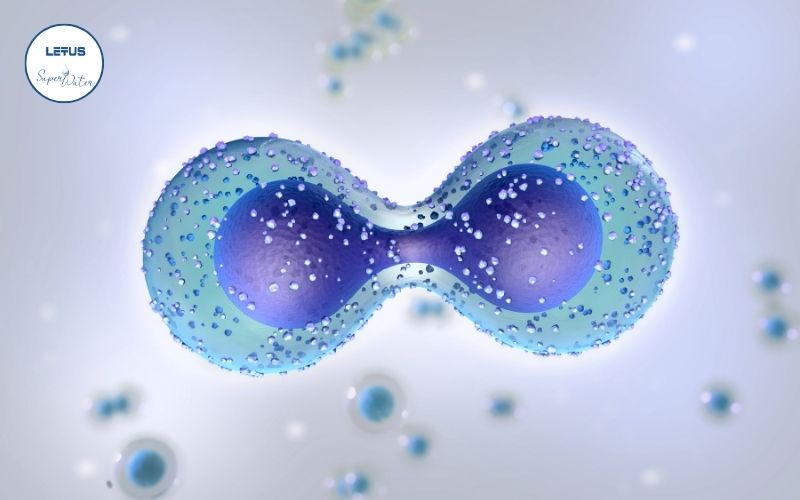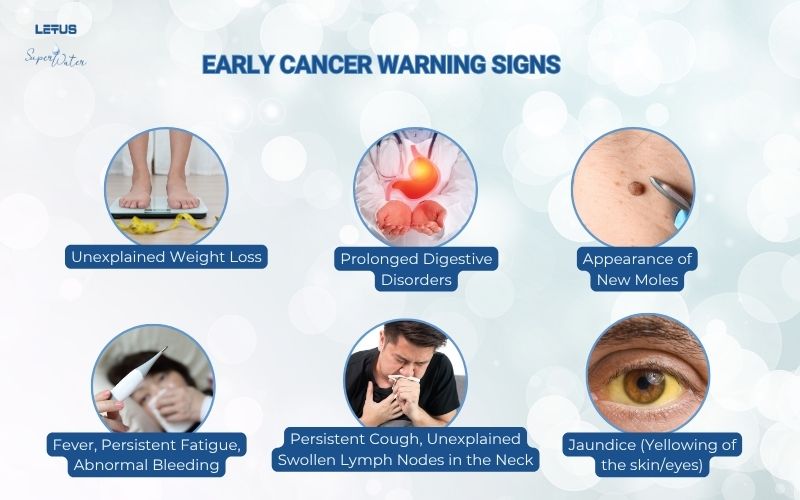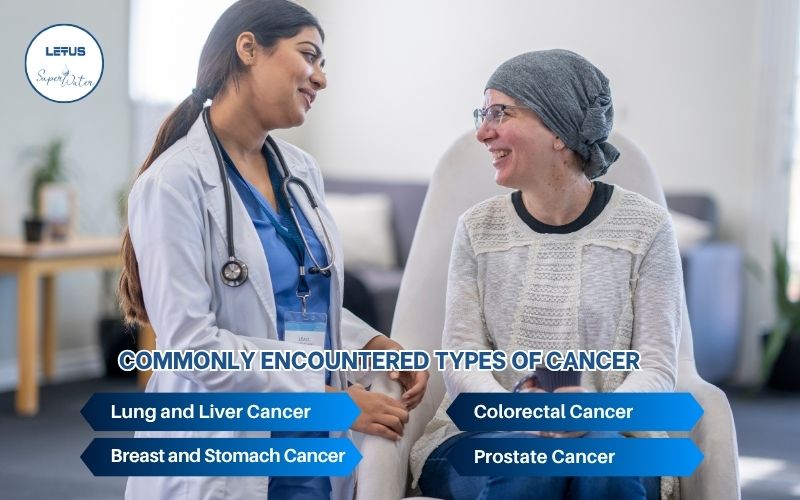1. Cancer and Essential Information: Causes of Cancer

Within our bodies, cells are constantly dividing, regenerating, and ending their life cycle naturally. However, sometimes some cells develop a “defect” during growth or an error during division, leading to the formation of cancer cells.
The causes of cancer may stem from this cellular “defect,” potentially due to genetics, environment, or simply a random chance during cell division.
Normally, the immune system quickly detects, eliminates, or inhibits the growth of these defective cells until they reach the end of their lifespan.
However, when the immune system is weak or less effective, these cells are not detected and dealt with; they survive and begin to divide uncontrollably, forming tumors.
2. Symptoms of Cancer

If you experience the following symptoms for about two weeks, you should seek a health check-up immediately:
- Unexplained Weight Loss: Sudden weight loss without a clear reason can be a warning sign of many types of cancer, especially stomach, pancreatic, and lung cancer.
- Persistent Fever: Unexplained fever, especially fever at night, can be a sign of certain cancers like leukemia or lymphoma.
- Prolonged Fatigue: A feeling of exhaustion or severe tiredness that persists despite adequate rest can be a symptom of many types of cancer.
- Persistent Pain: Unexplained pain in the bones, joints, or other parts of the body may be a sign of metastatic cancer.
- Abnormal Bleeding: Nosebleeds, bleeding gums, blood in the stool or urine, etc., can be signs of gastrointestinal, urinary tract, or other organ cancers.
- Persistent Cough: A prolonged cough, hoarseness, or shortness of breath can be signs of lung cancer.
- Swollen Lymph Nodes: Unexplained swelling of lymph nodes in the neck, armpits, or groin may be a sign of lymphoma or other types of cancer.
- Skin Changes: The appearance of new moles, or changes in the color, size, or shape of existing moles, or a non-healing sore can be signs of skin cancer.
- Digestive Disorders: Changes in bowel habits, persistent constipation, diarrhea, or abdominal pain can be signs of colorectal cancer.
- Jaundice (Yellowing of the skin or eyes): This can be a sign of liver cancer or other hepatobiliary diseases.
Learning about cancer and the essential information regarding its signs allows you to seek examination and live healthier with peace of mind.
3. Common Dangerous Types of Cancer

Cancer and essential information regarding some common cancer types:
- Lung Cancer: Occurs commonly, largely caused by smoking, manifested by a persistent cough, hoarseness, chest pain, difficulty breathing, etc.
- Breast Cancer: Most common in women, often causes pain and unusual symptoms.
- Colorectal Cancer: Symptoms include abdominal pain, persistent constipation or diarrhea, blood in the stool, etc.
- Prostate Cancer: Common in men, often causes difficulty urinating, frequent nighttime urination (nocturia), frequent urination (polyuria), blood in the urine, etc.
- Stomach Cancer: Largely caused by H. pylori bacterial infection, with symptoms including upper abdominal pain, indigestion, bloating, loss of appetite, and weight loss.
- Liver Cancer: Often linked to Hepatitis B and C, with symptoms of fatigue, loss of appetite, weight loss, jaundice, and abdominal swelling.
In addition, there are many other types of cancer, such as: blood cancer (leukemia), pancreatic cancer, ovarian cancer, uterine cancer, skin cancer, lymphoma, esophageal cancer, etc.
4. Cancer Metastasis and Conditions Leading to Cancer Cell Metastasis

The body’s mechanism facilitates cell development and division. The rapid division of cancer cells forces the body to supply more nutrients by creating new blood vessels to nourish the tumor. When the tumor reaches a sufficient size, the cancer cells begin to seek out other locations for nutrient supply, a process known as cell metastasis.
Metastasis is the process by which cancer cells detach from the primary tumor and travel to other sites in the body. This process makes cancer more dangerous and difficult to treat.
Cancer and essential information about the main stages of the metastatic process:
- Invasion: Cancer cells infiltrate the tissues surrounding the primary tumor.
- Angiogenesis: The tumor stimulates the formation of new blood vessels to supply nutrients to the cancer cells.
- Detachment: Cancer cells break away from the primary tumor.
- Travel: Cancer cells migrate through the lymphatic system or bloodstream to other sites in the body.
- Adhesion and Infiltration: Cancer cells attach to and infiltrate tissues at the new site.
- Secondary Tumor Formation: Cancer cells form secondary tumors at the new location, creating multiple tumors in the body that lead to health depletion.
Regular cancer screenings and having the essential information to prevent cancer are always the best ways to protect your family’s health.
5. Current Cancer Treatment Methods

Learn about cancer and the essential information regarding cancer treatment methods:
- Chemotherapy: Uses drugs to kill rapidly dividing cancer cells. It is often used for advanced stages of cancer or combined with other treatments.
- Radiation Therapy: Uses high-energy X-rays to destroy cancer cells; it can be used before, during, or after surgery.
- Surgery: Removes the tumor and surrounding affected tissues. It is often used for early-stage cancer when the tumor has not yet metastasized.
- Hormone Therapy: Uses hormones or hormone-blocking drugs to prevent the growth of hormone-dependent cancer cells. It is commonly used for cancers such as breast cancer and prostate cancer.
- Targeted Therapy: Attacks cancer cells by targeting specific proteins or molecules on the cancer cell surface. This is being researched and more widely applied in cancer treatment.
- Immunotherapy: Stimulates the body’s immune system to recognize and destroy cancer cells. This is a rapidly developing and very promising field of research.
Among these, drinking alkaline Hydrogen water is a supporting method believed to help reduce the formation of cancer cells, stimulate cancer cells to end their life cycle early, help reduce tumor size, and prevent the formation of new blood vessels, thereby reducing cancer cell metastasis.
Alkaline Hydrogen water is also claimed to support recovery after chemotherapy and radiation therapy by effectively hydrating the body, reducing oxidative stress that causes inflammation and swelling, supporting digestion for better appetite, and improving liver function, etc.
Regular health check-ups, a scientific diet and lifestyle, regular exercise, and drinking Letus SuperWater to reduce cell damage, minimize the causes of cancer, and having a clear understanding of essential information are the secrets to effective cancer prevention and supportive treatment.



